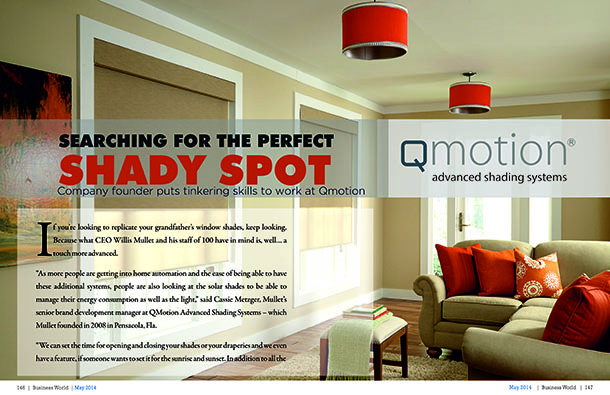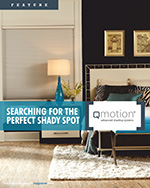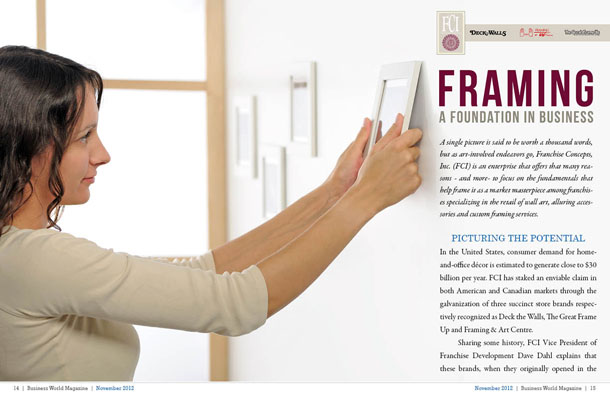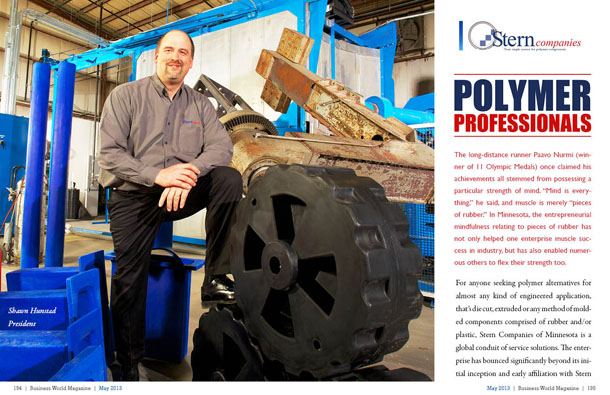
Searching for the Perfect Shady Spot
Company founder puts tinkering skills to work at QMotionÂ

If you’re looking to replicate your grandfather’s window shades, keep looking.
Because what CEO Willis Mullet and his staff of 100 have in mind is, well… a touch more advanced.
“As more people are getting into home automation and the ease of being able to have these additional systems, people are also looking at the solar shades to be able to manage their energy consumption as well as the light,†said Cassie Metzger, Mullet’s senior brand development manager at QMotion Advanced Shading Systems – which Mullet founded in 2008 in Pensacola, Fla.
“We can set the time for opening and closing your shades or your draperies and we even have a feature, if someone wants to set it for the sunrise and sunset. In addition to all the qualities that come with the fabric that help with the energy and light management, these accessories allow people to have even more control over how and when they use their shades.â€
A self-professed tinkerer by nature, Mullet created QMotion after years in the garage door and garage door opener business as CEO of the Ohio-based Wayne Dalton Corp. His lean toward innovation there was illustrated by the introduction of award- winning pinch-resistant sectional joints as well as a fully enclosed torsion-spring counterbalance system that soon became industry standards.
The idea for motorized window shading arrived when Mullet and his team were attempting to create a flexible membrane that could be integrated into a window system for use during hurricanes.
The necessity for a battery-operated shade became acute because power is often spotty during severe weather, but when Mullet and his engineering colleagues compiled all the available systems then on the market – then installed and evaluated each – the results were less than inspiring.
“To make a long story short, we weren’t impressed with any of them,†he said. “They were either too noisy of or too difficult to install, or the batteries didn’t last or they were difficult to disguise because of wires coming out from behind the shades that you’d have to tuck in or otherwise deal with.â€
The review of those products convinced Mullet of a market opportunity for ordinary window-shading systems in addition to hurricane protection, and, when the economy headed south and brought the building industry with it – the hurricane side was shelved in favor of the single approach.
QMotion operates out of a 100,000-square-foot facility in Pensacola that houses both its electrical and mechanical engineers along with its manufacturing operation, which, Mullet said, is an environment created to enhance the creativity and communication between those related functions.
The staff was much smaller, approximately 20, as recently as four years ago, but increased awareness of the products and an expansion in the company’s global reach to places like Europe and Australia has since warranted the quintupling of the employment roster.
Still, the United States remains the No. 1 territory for sales, Mullet said, and the company’s top customers are small or medium-sized dealers specializing in window coverings. A burgeoning market is being created by audio-visual dealers, who, as they install flat-screen TVs and home theater systems, also incorporate automated curtain systems as part of the comprehensive environment.
QMotion’s domestic business is strictly wholesale, Mullet said, while the international business is done with the company selling its motorized components – motor-control units with specialized counterbalance systems – to overseas fabricators who then build the actual shades. Those clients will market the products with their respective names, alongside a phrase like “powered by QMotion.â€
Germany, England, Austria, Switzerland, Italy and Australia combine for about 40 percent of the overall business, a portion Mullet said is “growing rapidly†and could take over as majority share.
Corporate decisions will eventually be made on continuing the process as is, or creating company-owned fabrication entities where demand is greatest, but Mullet said those calls are not imminent.
“I don’t think it’ll be anytime soon,†he said, “so yes, I think the component business is probably going to be a larger and larger part of our overall sales numbers.â€
As for its rapid ascent to status as an industry leader, Mullet said QMotion’s secret is its creativity.
The company developed the first motorized shade with a patented manual override system, which allows it to be operated by hand while causing no damage to the interior mechanisms. It’s been a particularly popular feature within the hospitality industry, where guests would often enter a room and pull on shades not knowing that they were automatically controlled – which often resulted in stripped motors.
Another advance centers on the batteries, he said, which are housed within the shade tube and therefore much easier to access at changing time by simply pulling the shade to expose the tube. Additionally, the battery life in QMotion devices is typically around five years, as compared to some existing products whose batteries expired after as little as six months of use.
“That’s probably our primary differentiator,†Mullet said.
In-house investments were made in January in anticipation of the 2014 launches of both a motorized venetian blind and a system to move draperies back and forth – and Mullet expects a continued rapid pace of innovation in a motorized shading industry he labels as still “in its infancy.â€
In fact, he said a saturation rate that now sits somewhere around 5 percent could legitimately rise into the 20, 25 or 30 percent neighborhoods within the next decade. Particular segments of growth are commercial settings like the hospitality industry, institutional settings like hospitals and nursing homes – though residential usage, too, could increase as building codes begin to mandate certain energy criteria.
“Go back far enough to see what happened with garage door openers,†he said. “I went from seeing garage door openers being kind of a novelty to what is now ubiquitous. And I can see the same thing happening with motorized shades. That would not surprise me in the next five to 10 years.â€
AT A GLANCE
WHO: QMotion Advanced Shading Systems
WHAT: Designer, developer, engineer and manufacturer of premium quality automated products – with a focus on automated               shading systems
WHERE: Pensacola, Fla.
WEBSITE: www.QMotionShades.com








